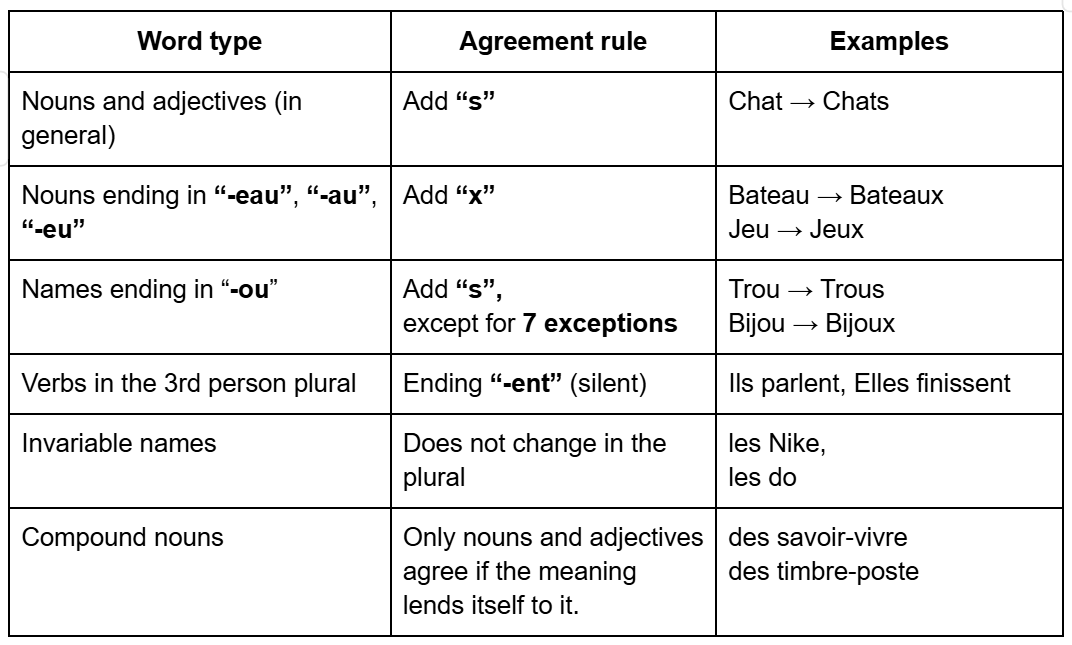How to agree the plural in French: s, ent, x
Introduction
Plural agreement in French may seem complex at first glance, but with a few grammatical rules, it becomes easy to master the s, x, and ent endings.
In this article, we’ll explore these agreement rules to help you choose the correct plural for nouns, adjectives, and verbs. Of course, we won’t forget to highlight the exceptions you absolutely must know.
1. Plural Rules for Nouns and Adjectives
Let’s start with most nouns and adjectives in French. It’s sometimes difficult to choose between « s » and « x » in the plural. Let’s take a closer look.
Plural in « s »
In most cases, simply adding an “s” to the end of a noun or adjective makes it plural.
- For example:
- ➤ Un chat → Des chats
- ➤ Une maison → Des maisons
- ➤ Grand → Grands
- ➤ Belle → Belles
💡 Tip: The « s » ending is the general rule for nouns and adjectives. It therefore applies to the vast majority of words.
⚠️ Be careful : to pronounce them the same way in the plural as in the singular. And yes, the pronunciation of these words doesn’t change.
So far, nothing very difficult, you might say.
Exception: But, of course, there is one exception to all this: nouns ending in “-ou”. In fact, they generally take an “s” in the plural except for seven of them: bijou, caillou, chou, genou, hibou, joujou, and pou which take a final “x”.
- ➤ un bijou → des bijoux
Plural in « x »
However, some nouns and adjectives do not take an “s” in the plural, but an “x”. This is generally the case for nouns ending in “-eau”, “-au”, and “-eu”.
- Examples:
- ➤ Un bateau → Des bateaux
- ➤ Un noyau → Des noyaux
- ➤ Un cheveu → Des cheveux
- ➤ Nouveau → Nouveaux
Another exception: nouns and adjectives in “-eu” generally take an “x” in the plural, except for two words: bleu, pneu which take a final “s”.
- ➤ un pneu → des pneus
2. Plural Agreement for Verbs ending in “-ent”
Now let’s continue with verbs.
Conjugation of Verbs in “-ent”
The ending “-ent” is used in the third person plural, in the present and imperfect indicative, in the present conditional and in the present subjunctive.
- For example:
- ➤ Ils parlent (verb “parler”, in the present indicative)
- ➤ Elles dansaient (verb “dancer”, in the imperfect indicative)
- ➤ Elles voudraient (verb “vouloir”, in the present conditional)
- ➤ Qu’ils finissent (verb “finir”, in the present subjunctive)
💡 Tip: Although the ending is “-ent”, it is not pronounced. So we say [il parl] for “ils parlent” without adding an extra sound for the “ent”.
3. Special Cases and Exceptions to Know About
In French, we have many exceptions! Here are some special cases you might encounter.
Invariable nouns in the plural
Some nouns do not change their spelling, whether they are singular or plural. This is the case for:
- 👉 names ending in “s”, “x” or “z”
- ➤ les pas, les noix; les nez
- 👉 names of Latin or Christian origin
- ➤ les nota bene, les requiem
- 👉 brand names
- ➤ les Citroën, les Nike
- 👉 proper names of people
- ➤ les Jeanne, les Dupond
- 👉 compound color names
- ➤ les rouge-prune, les poivre et sel
- 👉 the names of the letters
- ➤ les e, les p
- 👉 the numbers
- ➤ les huit, les neuf, …
- 👉 musical notes
- ➤ les do, les ré, les mi, …
- 👉 compound sentences or expressions
- ➤ des hors-la-loi
Plural of compound nouns
Let’s now move on to compound nouns, words joined together by a small line. They can be composed of nouns, adjectives, verbs, adverbs, and prepositions.
As a general rule, only nouns and adjectives can take the plural form if the meaning lends itself to it.
- For example:
- ➤ des balais-brosses, des ronds-points but des chefs-d’œuvre, des timbres-poste.
- ➤ des savoir-vivre, des va-et-vient
- ➤ des sourds-muets
- ➤ des à-côtés, des en-têtes, des arrière-boutiques
- ➤ des arcs-en-ciel, des chefs-d’œuvre but des pot-au-feu, des rez-de-chaussée, des tête-à-tête
4. Summary Table of the Main Plural Rules

Conclusion
Mastering the plural agreements in French, between the « s, » « x, » and « ent, » is an asset for speaking and writing correctly. We encourage you to learn to spot exceptions and apply general rules. Regular practice and observing words in various sentences will help you memorize these agreements more easily.
Guide for beginners
French: where to start?
This guide with the basics of French will allow you to:
✨ Know how to get started learning French
✨ Quickly acquire basic conversational skills
✨ Be able to get by during a first trip to France
Ready to start your apprenticeship? Let’s go !

Information
Legal notice
GTC
Customer reviews
FAQ

